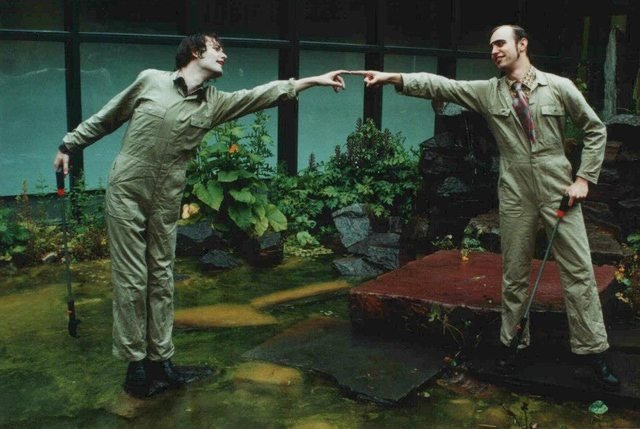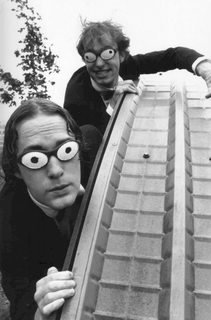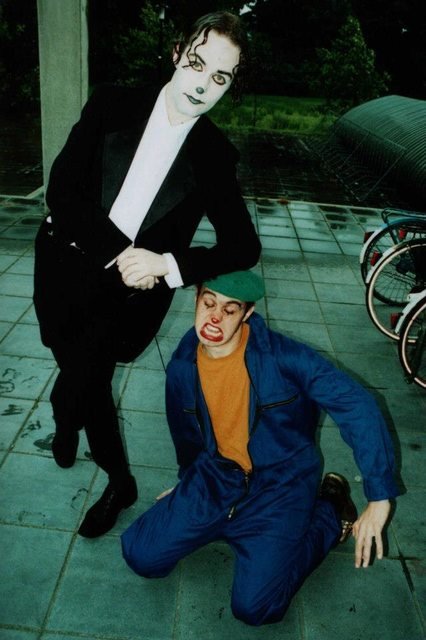Ignore Everyone! (Or how to become a blockchain entrepeneur in a roundabout way), part 1.
As a member of the Nxt Foundation, I get quite a lot of emails from people who want to start in cryptocurrency or in the blockchain industry (choose your nomenclature flavour of the day).
Most of these people have a technical background, and as I have no formal background in IT, it might be interesting to tell a bit about my journey to where I am now, combined with what I think are some key skills anyone should have when striking out on their own. I also would like to share some books that I think can be of use to a lot of people that probably aren't on any "10 books that changed my managerial life" list that are nevertheless worth a read.
Starting out
I've always been one of those people who are interested in just about anything. When I was a kid, I devoured books, on subjects ranging from aeronautics to insects, from chemistry to gardening. I just like to learn stuff for the sake of learning, and it has always shocked and surprised me that this doesn't seem to be the norm.
It makes me a fright at parties, I will grant you, as I'm also one of those people who can corner someone and drone on about a small subject well past the point of tears. I suppose you could call me a nerd, now I think about it.
I've always loved fantasy books, but not just as escapist stories. I also started reading up on how the stories were crafted and created, which is just as riveting as the stories themselves (at least to me). Learning how a car is constructed has the same kind of appeal to a lot of enthusiasts, I have noticed. The same goes for designers and programmers, of course. You don't just want to know that it is working, you want to know what makes it tick. One of the better books on this topic was Tree and Leaf by Tolkien. Read the essay "On Fairy-Stories". It's a one of the formative essays to imagination, in my opinion.
I've learned this is one of the first keys to any learning and success: interest! If you are easily bored or can't summon on interest in things, you are unlikely to make them stick in your mind. Once you think you have figured something out, you've closed your mind on it, even more so if you become blasé and become bored. Interest in the world around you is important!
Theatre
When at high school, things got rather turned around when I found an outlet for this jumble of interest: it turned out I was good at theatre! I also had the very good fortune in finding a mentor who taught me that while skills are important, creative drive is just as important and that these seldom are taught in formal study.
If you are lucky, you meet a few teachers that can stimulate and draw them out of you, but the educational system itself is not geared to making you creative. It's aimed, even when well-intentioned, to locking you into a curriculum and checking how well you do.

This doesn't only apply to "hard" topics like physics and maths, it definitely also applies to the Arts as I learned when I studied Theatre Studies. Things came to a head when I was expressly forbidden to work in "amateur theatre" with the reasoning amateurs cannot make professional theatre. When quizzed on the definition of "professional" all my professors could come up with was "they are paid for it". It was about that time I decided to quit my studies. I've never looked back.
This is not to say I just quit because they didn't agree. My ideas were field tested: I had already worked "professionally" in theatre during my study. I started off by assisting my mentor directing plays, and had also started my own company. My training was tough and I was thrown to the wolves by my mentor. Performing arts need testing in front of an audience, so that's what I did: I played, directed and wrote for over 15 years and in the process started two companies, because I could.

Most people thought I was mad for doing to: too risky and no "chance of success". I did it anyway, and made my living off it. People said I should specialise, but I just could not: it was the whole process that interested me, so I became actor, director, writer, teacher and lighting tech. I didn't become sound tech because frankly, I am crap at anything to do with sound, but I do understand the basics.
At the end of my career in theatre, I part time taught theatre tech and creative event organising at university level. In the end: put your money where your mouth is and prove people wrong by actions if you truly think you can do something.
The key ideas that I've learned from this period is that if you are convinced (and have tested this conviction!) to ignore all nay-sayers and to jump!
Books that helped me with this were "Don't Be Prepared" by Keith Johnstone, the inventor of Theatre Sports and "Ignore Everybody!" by Hugh MacLeod. The first book deals with how we are taught to be uncreative and how to break down these barriers. The second book offers some profound insight in how having a new idea creates a power struggle in relationships that will lead most people to discourage you. They also are both thoroughly grounded in real life.

This concludes part 1 of my short series on how I got where I am now. My main goal is to inspire and help people find their strengths and help them see they need not be lead by self-imposed limits.
This is not a Self-Help series! If you are truly bad at something, admit it and move on. However, if you are good at something or think you could be, don't hold yourself back. Enjoy learning and acquiring skills!
About the writer: my name is Bas Wisselink, also called Damelon. I am a member of the Nxt Foundation and an active part of the Nxt Community.